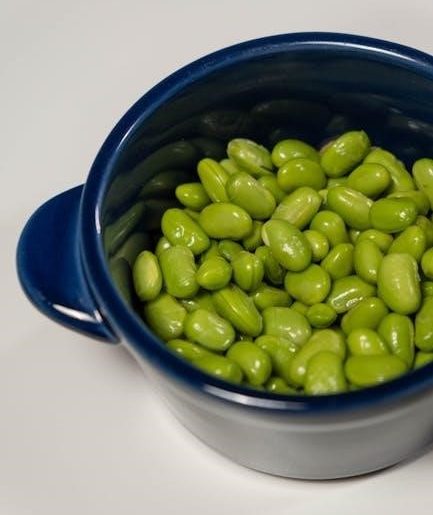A high protein, low carb vegetarian diet plan focuses on balancing protein-rich foods, healthy fats, and minimal carbs for weight loss and improved blood sugar control․
Overview of the Diet Plan
A high protein, low carb vegetarian diet plan is structured to balance nutrition while promoting weight loss and improved health․ It emphasizes whole, unprocessed foods like eggs, dairy, and plant-based proteins, while minimizing starchy carbs․ The plan typically includes a daily intake of 80-96g of protein, 48g of net carbs, and healthy fats to keep meals satisfying․ Meals are designed to be flavorful and varied, with options like protein-packed oatmeal, veggie omelets, and low-carb wraps․ Snacks such as berries and nuts provide fiber and protein․ The plan is customizable, offering flexibility to suit individual calorie needs and preferences, ensuring long-term sustainability․
Importance of Protein and Low Carb in Vegetarian Diets
Protein is essential for muscle repair and satiety, while low carbs help regulate blood sugar and promote weight loss․ Vegetarians often struggle to meet protein goals, making high-protein foods like Greek yogurt, tempeh, and eggs crucial․ A low-carb approach minimizes starches and sugars, focusing on vegetables and healthy fats․ Combining protein-rich foods with fiber-rich options ensures balanced nutrition and sustained energy․ This approach supports overall health, aids in weight management, and helps maintain muscle mass, making it a sustainable choice for vegetarians aiming to improve their diet’s effectiveness and nutritional balance․
Understanding the Benefits of a High Protein Low Carb Vegetarian Diet
A high protein, low carb vegetarian diet promotes weight loss, fat reduction, and improved blood sugar control while maintaining muscle and reducing hunger, offering sustained energy․
Weight Loss and Fat Reduction
A high protein, low carb vegetarian diet aids in weight loss by boosting metabolism and suppressing appetite․ By focusing on protein-rich foods like Greek yogurt, tofu, and legumes, the body burns fat more efficiently․ Low carb intake reduces insulin levels, promoting fat breakdown and preventing storage․ Balanced with healthy fats, this approach ensures sustained energy and reduces cravings․ Studies show vegetarians on this diet often lose more weight than those on high-carb plans, making it an effective choice for fat reduction and improved body composition․
Muscle Maintenance and Growth
A high protein, low carb vegetarian diet is essential for muscle maintenance and growth, as protein provides the building blocks for muscle repair and development․ Plant-based sources like Greek yogurt, tofu, tempeh, and legumes offer ample protein to support muscle synthesis․ Even without meat, a well-structured vegetarian diet can effectively promote muscle growth by ensuring adequate protein intake and balancing it with healthy fats and fiber․ This approach is particularly beneficial for vegetarians who engage in regular physical activity, helping them maintain lean muscle mass while supporting overall fitness goals․
Improved Blood Sugar Control
A high protein, low carb vegetarian diet helps regulate blood sugar levels by reducing carbohydrate intake, which minimizes insulin spikes․ Protein-rich foods like Greek yogurt, eggs, and legumes stabilize blood sugar and enhance insulin sensitivity․ By focusing on non-starchy vegetables and healthy fats, this diet slows down sugar absorption, preventing drastic fluctuations․ This approach is particularly beneficial for those with diabetes or prediabetes, promoting better glycemic control and overall metabolic health․ Balancing protein and fiber ensures sustained energy levels and supports long-term blood sugar management without compromising nutritional balance․
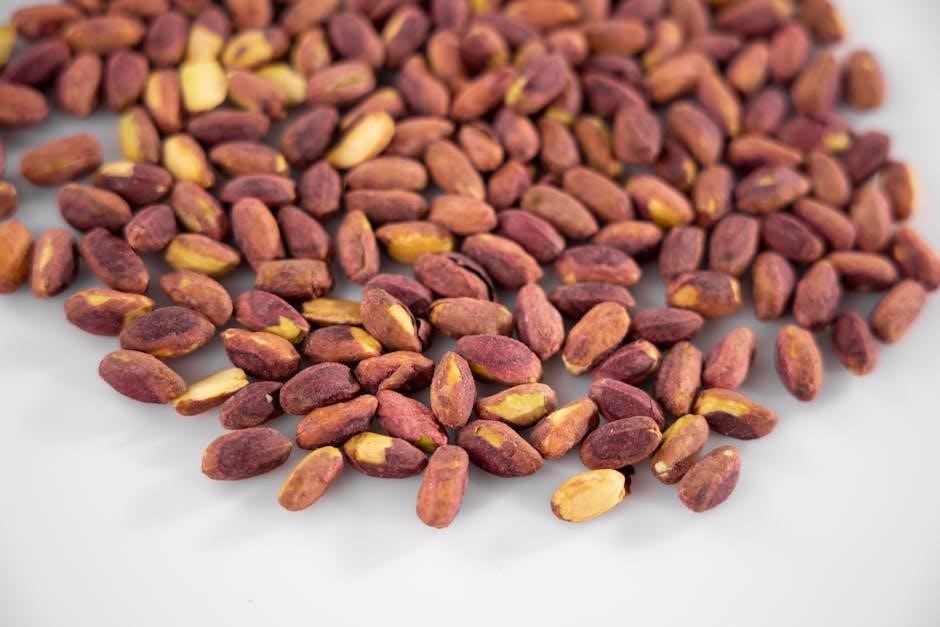
Key Components of a High Protein Low Carb Vegetarian Diet
Focuses on high-protein foods like Greek yogurt, eggs, and legumes, paired with low-carb vegetables such as spinach, broccoli, and cauliflower, plus healthy fats like avocado and nuts․
High Protein Food Sources for Vegetarians
Vegetarians can meet their protein needs through diverse food sources․ Legumes, such as lentils, chickpeas, and black beans, are rich in protein and fiber․ Tempeh and tofu are excellent plant-based protein options․ Quinoa is a complete protein and a great addition to meals․ Greek yogurt and cottage cheese provide high-quality protein․ Nuts and seeds, like almonds and chia seeds, offer protein and healthy fats․ Eggs and edamame are also great choices․ Incorporating these foods ensures a balanced and protein-rich vegetarian diet․
Low Carb Vegetarian Food Options
Low-carb vegetarian options focus on nutrient-dense foods․ Leafy greens like spinach, kale, and broccoli are rich in fiber and low in carbs․ Cauliflower, zucchini, and mushrooms are versatile, low-carb vegetables․ Avocado provides healthy fats with minimal carbs․ Cucumber, bell peppers, and asparagus are excellent choices․ For protein, include tofu, tempeh, and seitan․ Nuts and seeds like almonds, chia seeds, and flaxseeds add protein and healthy fats․ These foods help maintain a balanced, low-carb vegetarian diet while ensuring variety and nutritional completeness․
Healthy Fats and Fiber-Rich Foods
Healthy fats and fiber-rich foods are essential for a balanced diet․ Avocado, nuts, seeds, and olive oil provide healthy fats, supporting heart health and satiety․ Leafy greens, broccoli, and chia seeds are rich in fiber, promoting digestion and blood sugar control․ Incorporating these foods helps maintain energy levels and overall well-being, while aligning with low-carb and high-protein goals․ They also enhance meal satisfaction and support long-term dietary adherence, making them vital components of a high-protein, low-carb vegetarian diet plan․
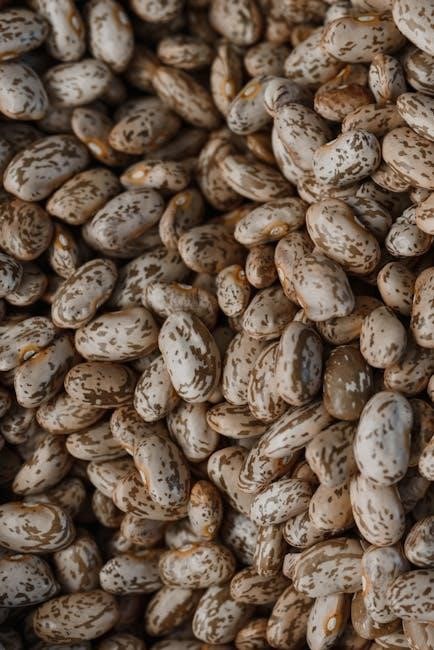
Meal Planning and Grocery List
A well-structured 7-day meal plan with a grocery list ensures adherence to high-protein, low-carb goals․ Include protein-rich breakfasts like oatmeal with protein powder, lunches with tempeh, and dinners featuring veggie-packed stir-fries․ Essential grocery items include Greek yogurt, tofu, eggs, avocados, and fibrous vegetables․ Practical tips like meal prepping and organizing your grocery list can simplify the process, helping you stay on track with your dietary objectives․
Sample 7-Day Meal Plan
This 7-day meal plan offers balanced, high-protein, and low-carb vegetarian options․ Start with a veggie omelet and apple slices for breakfast․ Lunches include Greek yogurt with berries and spinach or a low-carb wrap with hummus․ Dinners feature tofu stir-fries, quinoa salads, and lentil soups․ Snacks like cottage cheese, nuts, and veggies with guacamole keep you satisfied․ Each day focuses on nutrient-dense meals, ensuring protein goals are met․ Customizable and delicious, this plan supports weight loss and muscle maintenance while staying low in carbs and rich in fiber․ Easy to follow and packed with variety!
Breakfast Ideas (Protein-Packed and Low Carb)
Start your day with protein-packed, low-carb vegetarian breakfasts․ Enjoy a veggie omelet with spinach, mushrooms, and feta cheese․ Greek yogurt with berries and chia seeds is another great option․ Try protein oatmeal with almond butter and a splash of plant-based milk․ Low-carb wraps with scrambled eggs and avocado are also delicious․ Smoothies made with protein powder, spinach, and almond milk are quick and nutritious․ These breakfast ideas keep you full and energized, combining protein and healthy fats while keeping carbs low․ Perfect for weight loss and muscle maintenance!
Lunch and Dinner Recipes (Balanced and Nutritious)
For lunch, try stuffed bell peppers with quinoa, black beans, and veggies, providing a boost of protein and fiber․ A hearty lentil soup with spinach and avocado is another nutritious option․ Grilled tofu or tempeh salads with mixed greens, cherry tomatoes, and olive oil offer a balanced meal․ For dinner, opt for a vegetable stir-fry with tofu and cauliflower rice․ Protein-packed curries with chickpeas and low-carb vegetables are also ideal․ These recipes ensure you meet your protein goals while keeping carbs low, supporting weight loss and muscle maintenance․ They’re flavorful, nutritious, and easy to prepare!
Snacks and Desserts (Healthy and Low Carb)
For snacks, opt for hard-boiled eggs, mozzarella cheese, or roasted chickpeas․ Sliced veggies like cucumbers and bell peppers with hummus make a refreshing choice․ Greek yogurt with berries or a handful of almonds is also ideal․ Desserts can include dark chocolate squares (70% cocoa), chia pudding with coconut milk, or a fruit salad with a dollop of protein-rich nut butter․ These options are low in carbs, high in protein, and fiber-rich, ensuring satisfaction without compromising your dietary goals․ They’re perfect for curbing cravings while maintaining a balanced and nutritious vegetarian diet plan․

Challenges and Solutions for Vegetarian Low Carb Diets
Common challenges include ensuring adequate protein intake and managing carb cravings․ Solutions involve meal planning, incorporating plant-based proteins, and using low-carb alternatives to maintain variety and satisfaction․
Ensuring Adequate Protein Intake
Meeting daily protein goals on a vegetarian low-carb diet requires careful planning․ Include high-protein foods like Greek yogurt, tempeh, edamame, and legumes․ Incorporate protein-rich grains such as quinoa and farro․ Plant-based protein powders like pea or hemp can supplement meals․ Pair complementary proteins, such as whole grains with legumes, to maximize amino acid intake; Meal prepping with protein-packed dishes like lentil salads or tofu stir-fries ensures consistency․ Tracking protein intake with a food diary or app can help maintain accountability and guide adjustments for optimal nutrition․
Managing Carb Cravings and Portion Control
Curbing carb cravings and managing portions is crucial for a low-carb vegetarian diet․ Plan meals in advance to avoid impulsive choices․ Substitute high-carb foods with low-carb alternatives like cauliflower rice or zucchini noodles․ Use smaller plates to visually control portion sizes․ Stay hydrated, as thirst is often mistaken for hunger․ Incorporate healthy fats like avocado and nuts to reduce cravings․ Practice mindful eating by savoring each bite slowly․ Track food intake with a journal or app to maintain awareness and accountability․ These strategies help maintain discipline and long-term adherence to the diet․
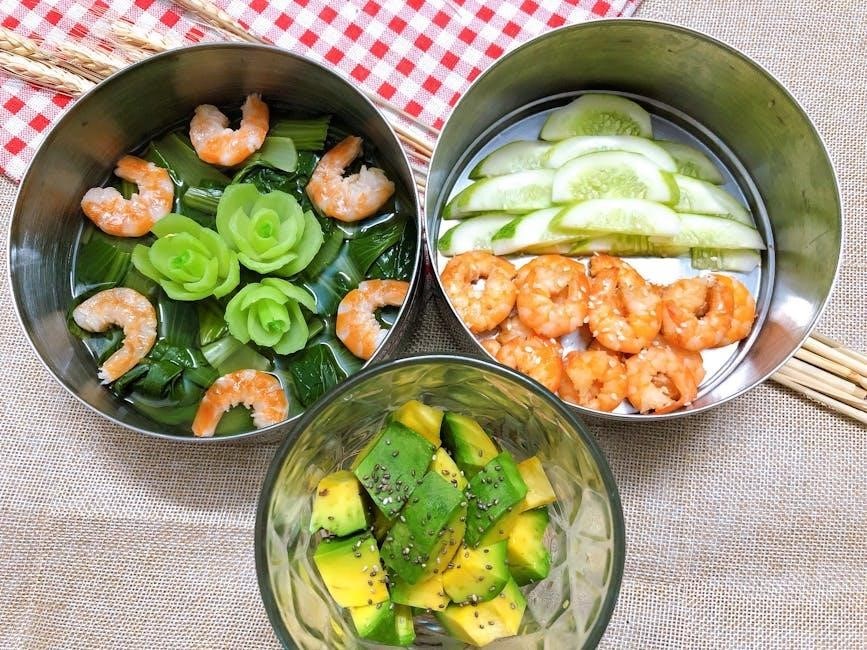
Role of Protein Powders and Supplements
Protein powders and supplements are essential for meeting daily protein goals in a vegetarian diet․ They offer convenience and ensure adequate intake without excess carbs or fats․
Best Plant-Based Protein Powders
Plant-based protein powders like pea, rice, and hemp are excellent for vegetarians; Whey protein isolate is lean and low in carbs․ Others include soy and collagen․ Opt for unsweetened, low-carb options to maintain your diet goals․ Always check labels for protein content and net carbs․ These supplements help meet daily protein needs, supporting muscle growth and weight loss․ Pair them with healthy fats and vegetables for balanced nutrition․ They are versatile and can be added to smoothies or baked goods․ Choose certified organic or non-GMO options for better quality and health benefits․
How to Incorporate Supplements into Your Diet
Incorporate plant-based protein powders into your diet by adding them to smoothies, oatmeal, or baked goods․ Take a scoop post-workout or as a quick breakfast option․ Ensure the powder is low in carbs and unflavored to avoid added sugars․ Pair protein powders with healthy fats like almond butter or avocado for sustained energy․ Consult with a nutritionist to determine the right dosage based on your protein goals․ Rotate between pea, hemp, and brown rice protein for variety․ Always check labels for low-carb content to maintain your dietary plan effectively․
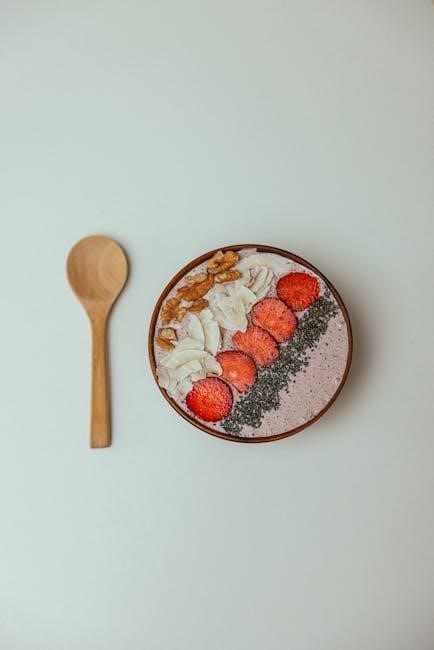
Frequently Asked Questions (FAQs)
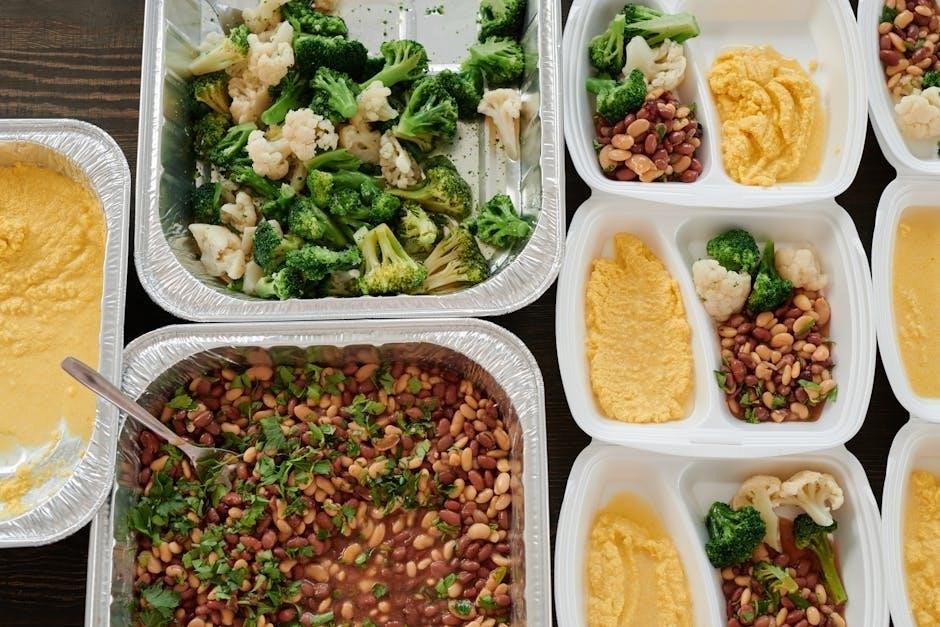
Common questions include how to maintain protein intake, manage carb cravings, and ensure nutrient balance in a vegetarian low-carb diet․ Answers focus on practical solutions․
Common Misconceptions About Low Carb Diets
A common myth is that low-carb diets are restrictive and lacking variety․ Many believe they require eliminating all carbs, but moderate intake is often permitted․ Another misconception is that low-carb diets are unsuitable for vegetarians, as plant-based protein sources like tofu, legumes, and dairy can be incorporated effectively․ Additionally, some think low-carb diets are unhealthy, but they can promote weight loss and improve blood sugar control when balanced with nutrient-rich foods; Understanding these misconceptions helps in adopting a sustainable and enjoyable low-carb vegetarian lifestyle․
Tips for Maintaining a Vegetarian Low Carb Lifestyle
Maintaining a vegetarian low-carb lifestyle requires planning and creativity․ Focus on whole, nutrient-dense foods like vegetables, lean proteins, and healthy fats․ Incorporate plant-based protein sources such as tofu, tempeh, and legumes․ Meal prepping can help ensure consistency and reduce the temptation to deviate․ Stay hydrated and listen to your body’s nutritional needs․ Explore low-carb alternatives to favorite dishes to keep meals exciting․ Regularly review and adjust your diet plan to maintain balance and prevent cravings․ Seeking support from like-minded communities can also enhance long-term success․
A high protein, low carb vegetarian diet offers sustainable weight loss, improved health, and balanced nutrition; It’s a versatile and effective lifestyle choice for long-term wellness․
Long-Term Sustainability of the Diet
The high protein, low carb vegetarian diet is sustainable due to its emphasis on whole, nutrient-dense foods like vegetables, lean proteins, and healthy fats․ By avoiding starchy carbs and focusing on fiber-rich options, individuals can maintain weight loss and improve blood sugar control over time․ The diet’s flexibility allows for varied meal planning, preventing monotony and ensuring long-term adherence․ Additionally, the inclusion of plant-based proteins and fats supports overall health, making this diet a practical choice for sustained wellness and vitality․

Encouragement and Next Steps
Embrace the high protein, low carb vegetarian diet with confidence! Start by downloading the comprehensive PDF guide, which offers detailed meal plans and grocery lists tailored to your needs․ Begin with small, achievable changes, like incorporating protein-rich breakfasts or swapping high-carb snacks for low-carb alternatives․ Track your progress, celebrate milestones, and stay motivated by the visible results․ For personalized support, consider consulting a nutritionist to fine-tune your plan․ Remember, consistency is key—stick to the plan and enjoy the transformative benefits of a healthier, more balanced lifestyle․

Downloadable PDF Guide
Access a comprehensive high-protein, low-carb vegetarian diet plan in PDF format, complete with meal plans, recipes, and a grocery list for easy implementation․
How to Access the Full Meal Plan and Recipes
To access the full high-protein, low-carb vegetarian meal plan and recipes, download the PDF guide․ It includes a 7-day structured plan with calorie-specific options (e․g․, 1000-calorie or 1600-calorie plans), detailed recipes, and a customizable grocery list․ The guide offers practical tips for meal prep and ensures balanced nutrition with protein-rich foods, low-carb alternatives, and healthy fats․ Recipes like oatmeal with protein powder, veggie omelets, and low-carb wraps are featured․ Perfect for weight loss and maintaining a plant-based lifestyle, the PDF provides everything needed to start and sustain the diet effortlessly․
Customizing the Plan for Individual Needs
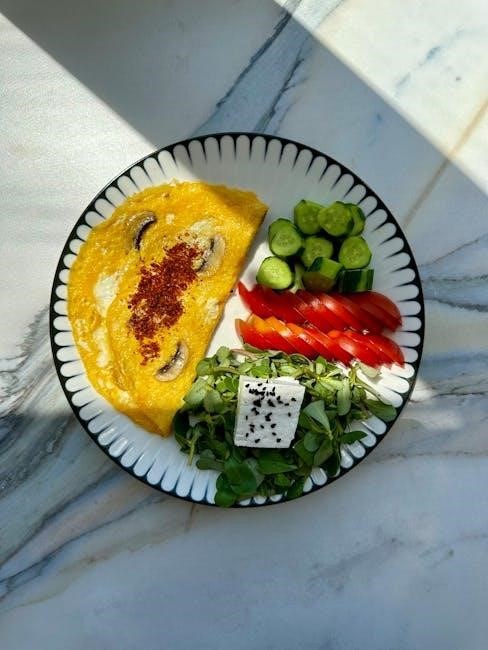
The high-protein, low-carb vegetarian diet plan can be tailored to suit personal preferences and goals․ Adjust the portion sizes based on your calorie needs, such as choosing between 1000-calorie or 1600-calorie plans․ Swap ingredients in recipes to incorporate your favorite foods while maintaining the diet’s principles․ Use the customizable grocery list to ensure you have all the necessary items․ For example, swap tofu for tempeh or add different vegetables to keep meals varied․ Consulting with a nutritionist or dietitian can also help refine the plan for specific health or fitness objectives, ensuring it aligns with your lifestyle and dietary requirements․
